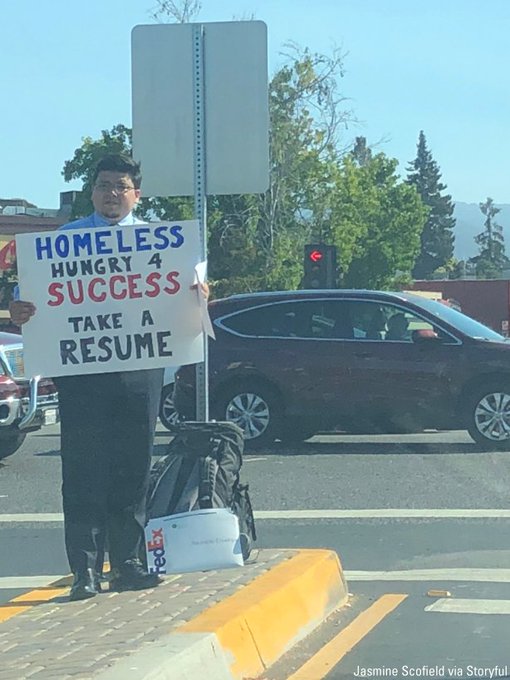Want to start a business? Good for you. Just don’t make the mistakes that David Casarez made.
Casarez, a twenty-something software developer, made news this week when a passerby took a picture, which went viral, of him holding up a sign on a street corner in Mountain View, Calif., — Google’s home town — that read “Homeless hungry 4 success take a resume.”
“I told myself all I need is just one person out there to say ‘hey, this guy is worth giving a shot’,” he told Fox News.
Well, he’s certainly getting a shot. As a result of all the attention, he’s received hundreds of interview offers from tech firms (including Google. For the past year he’s been living in his car but is now living in into a hotel room, courtesy of a $500 Airbnb gift certificate provided to him by a nonprofit.How did this young man wind up in this predicament? According to Business Insider, Casarez had quit his job as a software developer at General Motors last year so that he could launch his own tech startup. “Would I rather be on my deathbed knowing I didn’t take the risk or knowing that I did?” he asked himself. “That’s what really pushed me to leave the comfort of working at GM.”I’m guessing the story struck a nerve with people because it’s not every day that you see a college-educated, skilled worker made homeless because he couldn’t afford the high price of living in Silicon Valley. But to me, I see something quite different: a young, naive entrepreneur who made two very huge mistakes that no one should make when starting up a business.First, Casarez made the mistake that many would-be young entrepreneurs make: they think they can be entrepreneurs.No, you’re not Mark Zuckerberg or Elon Musk. The stories of the hot, young startup geniuses who make the cover of Forbes are just a tiny, tiny representation of startup founders. Few of them succeed because starting up a business is extremely difficult. It takes lots of money and experience. That’s why, according to recent research, successful startup owners are, on average age, 45 years old. If, as Business Insider reported, Casarez had such a hankering to develop a “multi-sided platform covering the food industry, picking up where services like Blue Apron had left off,” (whatever that means) the right path for him would’ve been to quit his job at GM and take a job – no matter how menial – at Blue Apron or any one if its numerous competitors like Sun Basket, Home Chef or Home Bistro.That way he could spend five to 10 years (yes, years) in the industry learning the ropes, understanding the market, becoming expert with the underlying technology and forming a network of people who could potentially join (or fund) him in his venture once he launches it.I get it. When you’re in your swaggering twenties you believe you can conquer the world as easily as you can stay out to three in the morning on a Tuesday night and still show up at your job ready to work at eight. But time, nature and the reality of the world catches up. People don’t want to invest in a startup run by a kid without experience or a plan, no matter how good his idea may be. Casarez found this out the hard way.But perhaps the biggest lesson Casarez learned is this: you never, ever, ever, ever bet the farm on your startup. Apparently, he cashed out his 401(K) (and really, how much could that have accumulated when you’re still in your twenties?), packed up his meager belongings and headed to Silicon Valley knowing full well that he didn’t even have enough money for rent and would wind up living out of his van.People who know what they’re doing would never do this. Sure, you’re taking a risk when you start a business. But no one says you have to risk it all. That’s what banks, venture capitalists, angel investors, the Small Business Administration and crowdfunding sites are there for.Of course you don’t want to give away too much equity, but betting everything you have on a business venture, regardless of how confident you are about it, is just…well…stupid business. My most successful clients make bets all the time on people, equipment, partnerships and startups too. But, like going to Vegas, they’re prepared to bet only what they’re willing to lose, and no one in their right mind is willing to lose everything. Otherwise you’ll end up on a street outside of Google holding up a sign begging for a job.Casarez says he wants to someday be an entrepreneur again. Good for him. But my advice to him – and any young, wannabe business owner — is to just take a deep breath, work hard in your chosen industry, get lots of experience and learn. Then go out and make your mark.www.entrepreneur.com





